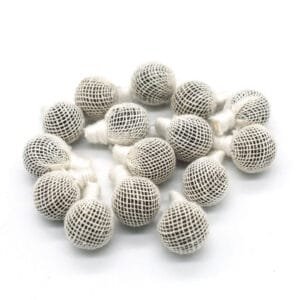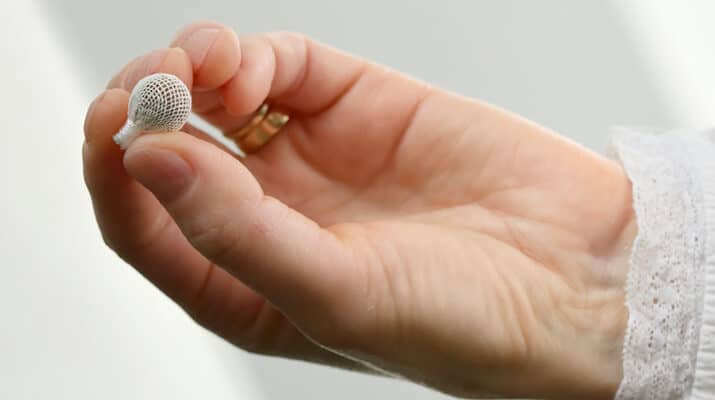They say practice offers no benefit
By Deborah Jeanne Sergeant
 Two generations ago, young women were advised to douche to achieve feminine hygiene.
Two generations ago, young women were advised to douche to achieve feminine hygiene.
Today, the trend is detox pearls, also called yoni pearls or gems.
These cloth-covered balls of herbs are inserted into the vagina and are purported to clean the vagina, “detox” the uterus, improve fertility, reduce inflammation, promote circulation, stop odors, clear up cysts and remove dead cells.
Just because something is popular does not necessarily mean it is a good idea. Numerous studies indicate that douche does not offer any health benefits and can interfere with vaginal health. Yoni pearls are similar in numerous ways, including why women buy them.
“We should be looking at these things skeptically. Why do I need these pearls to be liked, to be considered good enough?” said Nicole Christina, a licensed clinical social worker practicing in Syracuse, who created the Zestful Aging podcast and sees many patients about body image issues. “This is about anxiety. Shame is a huge thing. What if someone says, ‘I don’t like you because you’re stinky.’ Is your ego that fragile that this would destroy you?”
Yoni pearls are often sold by manufacturers in countries lacking the same level of oversight as the United States. This also troubles Christina.
“How eager we are to give over our health to some entity who we don’t have any proof of their expertise,” she said. “It seems so sketchy. It is really sad that we’re so eager to believe that we need to be fixed, improved; that our lives should be a self-improvement project.”
The FDA has not evaluated yoni pearls for use. Anything at all could be inside the mesh balls.
“It’s a horrible idea, to be quite blunt,” said Jessica L. Schock, certified nurse midwife with Canandaigua Medical Group. “The vagina is a self-cleaning oven. It’s one of the few places that regulates itself and cleans itself.”
Like Christina, she thinks that the desire to clean or “detox” the vagina stems from misconceptions about anatomy as well as cultural notions.
“We have this thing about the female genitalia and sexuality,” Schock said. “It’s another way to say there’s something wrong with you and we made something to fix it. Consumers are throwing money at people who feed into a shame cycle for women.”
The vagina naturally discharges clear to whitish fluid as part of its self-cleaning capacity. Sometimes that discharge is greater than at other times and may have a scent. However, that does not indicate a problem.
“People who think something is wrong with them because it doesn’t smell like a daisy feed into this whole issue,” Schock said.
Most of the time, the offensive odor is perspiration—not an indicator that something is wrong with the vagina. Visiting a gynecologist can determine if discharge is harmless.
Trying to fix the “problem” with yoni pearls can actually cause problems. If they are effective at killing bacteria, killing the good bacteria can cause an overpopulation of the harmful bacteria and cause toxic shock syndrome. Tampons should not remain in the body for more than eight hours because of the risk of TSS. However, yoni pearl producers advocate leaving their product in the vagina for 24 to 72 hours, which allows more time for bacteria to build up on the pearls. That can lead to TSS and pelvic inflammatory disease.
“Putting something that’s unknown into your body, it opens you up to issues like vaginitis, vagina irritation,” Schock said. “And if you get rid of the healthy mucus, you can open yourself up to damage to the vagina.”
The texture of the cloth can also irritate the delicate tissue of the vaginal wall.
Manufacturers of yoni pearls claim that their products can prepare the uterus for pregnancy and tighten the vagina. However, no evidence exists that these claims are true—and anatomy says differently.
“When you think about how the uterus, cervix and vagina work, the cervix is tightly shut unless menstruating or pregnant,” Schock said. “Using pearls increases risk for toxic shock. It’s also unregulated and a lot of these come from out of the country. Even if it has what it says in it, should it really be in the vagina?”
While manufacturers may claim that yoni pearls’ herbs mean that they are natural, inserting herbs into a body cavity is much different from ingesting them and does not necessarily mean they are safe used in that way.
Women concerned about vaginal discharge should seek help from their healthcare provider instead of inserting anything into the vagina.

